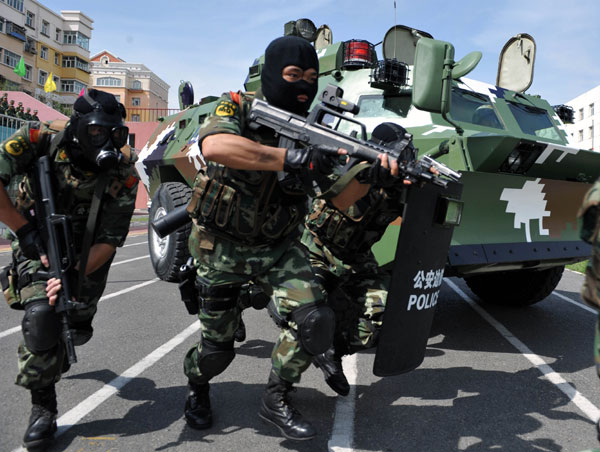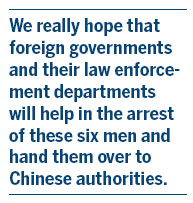Authorities name six as terrorists
Updated: 2012-04-07 09:02
By Zhang Yan (China Daily)
|
||||||||
Chinese police have published a list naming six men they suspect of being terrorists and have decided to freeze their assets.
The six are all believed to be core members of "East Turkistan Islamic Movement", a terrorist group in Pakistan, according to a statement issued by the Ministry of Public Security on Thursday.
They all hail from the Xinjiang Uygur autonomous region, it said.
|
 |
|
A brigade with the border control department of the Xinjiang Uygur autonomous region's public security bureau stages a drill in May 2011. Soldiers with the brigade have been carrying out anti-terrorist tasks and dealing with emergencies for years. [Photo/Xinhua] |
"They have participated in organizing, planning, recruiting, and carrying out terrorist acts against Chinese targets within and outside the country," said a ministry press officer.
One of them, Nurmemet Memetmin, 47, is suspected of helping to found the East Turkistan Islamic Movement in 1997. Police say that he, as a commander of the organization, published text and video statements on the Internet in August 2011.
|
 |
He is also suspected of setting up a terrorist training camp in a South Asian country in 1997 and working as a military instructor there. Police say he trained dozens of terrorists, some of whom later became ringleaders, military instructors and important members of the organization.
Nurmemet Memetmin is suspected of sending an alleged member of the organization, Memtieli Tiliwaldi, to China in 2007. Once there, Memtieli Tiliwaldi and other terrorists are believed to have staged a series of murders, bombings and arsons in Kashgar, Xinjiang, in July 2011, killing and injuring civilians and police officers.
Police say Nurmemet Memetmin posted an online statement in August 2011, claiming the terrorist acts were committed by the East Turkistan Islamic Movement.
Another of the suspects, Abdulkyum Kurban, 30, is believed to be a propaganda chief for the organization. Police say he has been inciting extremism and terrorism since 2009. He is suspected of using video-taped statements in August and October 2011 to inspire extremists and terrorists in China to kill themselves in suicide bombings and to attack civilians with cleavers.
Two other suspects, Paruh Tursun, 40, and Tursunjan Ebibla, 31, are accused of belonging to the organization and of instigating terrorist acts.
Nurmemet Raxit, 42, is suspected of recruiting terrorists, assisting in the production of terrorist propaganda videos and providing money for terrorist acts.
Mamat Imin Nurmamat, 29, is suspected of planning arsons and murders in Shche county, Xinjiang, in July 2009, which were discovered and stopped by Chinese police. In October 2009, he and other terrorists are believed to have accidentally caused an explosion while making bombs in Shche, leaving one person dead and another injured. Police say he fled China after the explosion.
He is believed to next have undergone terrorism training in a South Asian country and then traveled to a Southeast Asian country to recruit members for the East Turkistan Islamic Movement.
Recent years have seen Chinese police deliver a heavy blow to that organization. They have cracked dozens of terrorism cases and foiled various attacks, the ministry said.
Even so, the organization is still disseminating propaganda and inspiring its members in China to propagate the "three evil forces" of separatism, extremism and terrorism, the statement said. It is also attempting to commit terrorist acts, according to the statement.
The group is the most direct and real threat that China is faced with, the ministry official said.
"We really hope that foreign governments and their law enforcement departments will help in the arrest of these six men and hand them over to Chinese authorities," he said.
Terrorists mainly raise money by trafficking in drugs or people or by smuggling firearms, said Dai Peng, director of the Chinese People's Public Security University's criminal investigation department.
"The money often prompts them to initiate terrorist attacks," he said. "When there's no money, it's impossible to make an attack."
China's anti-terrorism authorities issued their first list identifying "Eastern Turkistan" terrorists in December 2003 and their second list in October 2008. The most recent one is their third.
The latest release comes after a legislative resolution was passed by China's top legislature in October, empowering the government to identify terrorists and their organizations and freeze their assets in the country.
Xinhua contributed to this story.
Zhangyan1@chinadaily.com.cn

 Relief reaches isolated village
Relief reaches isolated village
 Rainfall poses new threats to quake-hit region
Rainfall poses new threats to quake-hit region
 Funerals begin for Boston bombing victims
Funerals begin for Boston bombing victims
 Quake takeaway from China's Air Force
Quake takeaway from China's Air Force
 Obama celebrates young inventors at science fair
Obama celebrates young inventors at science fair
 Earth Day marked around the world
Earth Day marked around the world
 Volunteer team helping students find sense of normalcy
Volunteer team helping students find sense of normalcy
 Ethnic groups quick to join rescue efforts
Ethnic groups quick to join rescue efforts
Most Viewed
Editor's Picks

|

|

|

|

|

|
Today's Top News
Health new priority for quake zone
Xi meets US top military officer
Japan's boats driven out of Diaoyu
China mulls online shopping legislation
Bird flu death toll rises to 22
Putin appoints new ambassador to China
Japanese ships blocked from Diaoyu Islands
Inspired by Guan, more Chinese pick up golf
US Weekly

|

|






